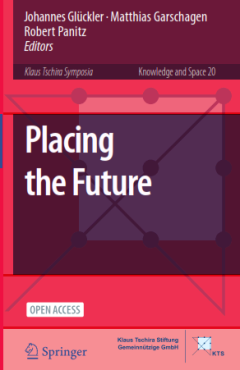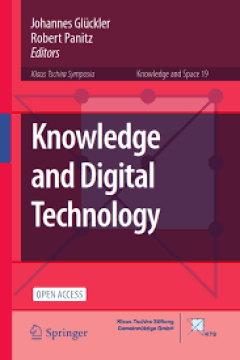Filter by

Placing the Future
Buku akses terbuka ini menawarkan perspektif baru tentang ketidakpastian masa depan yang dihadapi oleh umat manusia. Para cendekiawan terkemuka dari bidang studi masa depan, perencanaan, geografi, sejarah, sosiologi, desain, dan humaniora mengedukasi mengenai peran rumit geografi dalam membangun pengetahuan untuk mengantisipasi kemungkinan, membayangkan alternatif, dan mengimplementasikan masa …
- Edition
- -
- ISBN/ISSN
- 978-3-031-76841-5
- Collation
- online resource ( X, 342 Pages)
- Series Title
- Pengetahuan dan Ruang
- Call Number
- 303.49 GLU p

Professions and Proficiency
This open access book takes an original view on the social production of knowledge in and across space. It explores how people build and transfer proficiency within and beyond the bounds of social groups. Social groups, such as professions, epistemic communities, or academic disciplines, collectively organize to help individuals gain understanding of and knowledge about specific subjects of exp…
- Edition
- -
- ISBN/ISSN
- 978-3-031-24910-5
- Collation
- X, 270
- Series Title
- Knowledge and Space (KNAS, volume 18)
- Call Number
- 334 PRO

Knowledge and Digital Technology
This open access book explores the multifaceted interplay of technology, knowledge, and place. While digital technology is increasingly influencing our way of knowing, conversely it is itself the consequence of human creativity and local social interaction. Part I analyzes how digital technologies transform markets through artificial intelligence and decentralized blockchain models. Its contrib…
- Edition
- -
- ISBN/ISSN
- 978-3-031-39101-9
- Collation
- X, 289
- Series Title
- Knowledge and Space (KNAS, volume 19)
- Call Number
- 334 KNO

Knowledge and Civil Society
This open access book focuses on the role of civil society in the creation, dissemination, and interpretation of knowledge in geographical contexts. It offers original, interdisciplinary and counterintuitive perspectives on civil society. The book includes reflections on civil and uncivil society, the role of civil society as a change agent, and on civil society perspectives of undone science. …
- Edition
- -
- ISBN/ISSN
- 978-3-030-71147-4
- Collation
- X, 316
- Series Title
- Knowledge and Space (KNAS, volume 17)
- Call Number
- 306 KNO

Knowledge for Governance
This open access book focuses on theoretical and empirical intersections between governance, knowledge and space from an interdisciplinary perspective. The contributions elucidate how knowledge is a prerequisite as well as a driver of governance efficacy, and conversely, how governance affects the creation and use of knowledge and innovation in geographical context. Scholars from the fields of …
- Edition
- -
- ISBN/ISSN
- 978-3-030-47150-7
- Collation
- XIII, 469
- Series Title
- Knowledge and Space (KNAS, volume 15)
- Call Number
- 334 KNO

Knowledge and Networks
This open access book bridges the disciplinary boundaries within the social sciences to explore the role of social institutions in shaping geographical contexts, and in creating new knowledge. It includes theorizations as well as original empirical case studies on the emergence, maintenance and change of institutions as well as on their constraining and enabling effects on innovation, entrepren…
- Edition
- -
- ISBN/ISSN
- 978-3-319-45023-0
- Collation
- XII, 386
- Series Title
- Knowledge and Space (KNAS, volume 13)
- Call Number
- 334 KNO

Knowledge and Institutions
This open access book bridges the disciplinary boundaries within the social sciences to explore the role of social institutions in shaping geographical contexts, and in creating new knowledge. It includes theorizations as well as original empirical case studies on the emergence, maintenance and change of institutions as well as on their constraining and enabling effects on innovation, entrepren…
- Edition
- -
- ISBN/ISSN
- 978-3-319-75328-7
- Collation
- X, 310
- Series Title
- Knowledge and Space (KNAS, volume 13)
- Call Number
- 334 KNO

Knowledge and Digital Technology
- Edition
- Volume 19
- ISBN/ISSN
- 978-3-031-39100-2
- Collation
- -
- Series Title
- -
- Call Number
- -
- Edition
- Volume 19
- ISBN/ISSN
- 978-3-031-39100-2
- Collation
- -
- Series Title
- -
- Call Number
- -
 Computer Science, Information & General Works
Computer Science, Information & General Works  Philosophy & Psychology
Philosophy & Psychology  Religion
Religion  Social Sciences
Social Sciences  Language
Language  Pure Science
Pure Science  Applied Sciences
Applied Sciences  Art & Recreation
Art & Recreation  Literature
Literature  History & Geography
History & Geography